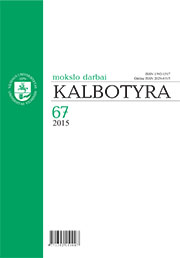Akvizityviniai veiksmažodžiai gauti ir tekti senuosiuose XVI–XVII a. lietuvių kalbos raštuose
Acquisitive verbs gauti ‘get’ and tekti ‘be gotten’ in the 16th–17th century texts of Old Lithuanian
Author(s): Erika Jasionytė-MikučionienėSubject(s): Language studies, Language and Literature Studies, Historical Linguistics, Comparative Linguistics, Baltic Languages
Published by: Vilniaus Universiteto Leidykla
Keywords: acquisitive verbs; acquisitive modality; modal and non-modal meanings; participant-internal and participant-external possibility; Old Lithuanian writings;
Summary/Abstract: The present paper deals with the verbs gauti ‘get’ and tekti ‘be gotten’ as a means of acquisitive modality in the 16th–17th century texts of Old Lithuanian. The realizations of acquisitive modality in Old Lithuanian have not been examined yet. Thus, the aim of the paper is to explore the use of the verbs gauti ‘get’ and tekti ‘be gotten’ in the selected Old Lithuanian texts and to discuss the potential direction of the development of their modal meanings. The study of the Old Lithuanian writings shows that both verbs gauti ‘get’ and tekti ‘be gotten’ are most frequently used as non-modal verbs in Old Lithuanian. The verb gauti ‘get’ typically comes in personal constructions, while the verb tekti ‘be gotten’ appears in impersonal as well as personal constructions. The Lithuanian verbs under consideration denote acquisition in the constructional patterns with NP as their grammatical object. However, the thorough analysis of the verbs in the selected texts also reveals evidence of their modal use. The modal meanings of the verbs under study are prominent in constructions with an infinitival complement. Both acquisitive verbs allow modal readings with transitive as well as intransitive verb complements. Gauti ‘get’ functions as a modal verb more frequently than tekti ‘be gotten’. The few modal instances of the latter have been found only in non-original texts. Moreover, the verb tekti ‘be gotten’ can express participant-external modality only (possibility or necessity). However, since the examples of modal tekti ‘be gotten’ come from the translations from Polish, the influence of the source language should not be overlooked. In contrast, the verb gauti ‘get’ functions as a modal verb in both original and non-original Lithuanian texts, and it expresses actualized possibility, participant-internal and participant-external possibility. It was noticed that the participant-external use is more frequent than the participant-internal one. Since in Contemporary Lithuanian gauti ‘get’ is specialized for expressing participant-external modality, we may assume that participant-internal possibility might have disappeared over time. It is also worth to note that in the texts under analysis gauti ‘get’ does not display the modal meaning of necessity, which is a frequent use of the verb in Contemporary Lithuanian. Thus, its meaning of modal necessity may have developed later than the meaning of possibility. Moreover, it has been observed that gauti ‘get’ typically occurs as a modal verb in the texts published in Minor Lithuania.
Journal: Kalbotyra
- Issue Year: 2015
- Issue No: 67
- Page Range: 24-44
- Page Count: 21
- Language: Lithuanian

